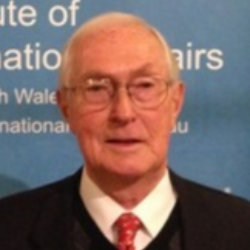GEOFF MILLER. Xi Jinpings China: this too will pass?
October 30, 2017
Xi Jinpings first five years have produced a China in which the Communist Party is in more control of more things, and restrictions on dissent and the free expression of opinion have grown. The recently concluded Party Congress seems to offer more of the same. But how will this recipe stand with a population growing steadily more prosperous, better educated and more familiar with the outside world?
Commenting on the 19th Party Congress Kerry Brown, the noted British Sinologist, said in an article in Inside Story on 28 October that one of the striking features of the Congresswas the fact that it seemed remote, highly elitist and introspective—an elite speaking its own dialect, focused on its own culture, and somehow unable to connect with the wider world. The key ideological formulation that it endorsed, Xi Jinping thoughtseems a bit retro.
Speaking to the Lowy Institute on 27 October Joseph Kahn, the Managing Editor of the New York Times and a former reporter from China, said that Xis emphases and practices, e.g. imprisonment of human rights activists and dissidents like Nobel Peace Prize winner Liu Xiaobo, ever harsher and more intrusive press and internet censorship, social tracking and the larger role of the party, including in the economy and businesses, have reversed the admittedly lukewarm trend towards liberalisation which Western observers had seen during the Jiang and Hu Presidencies, and which they had thought would continue.
If the Congresss ideological outcome is indeed a bit retro, reverses prior liberalising trends, and stands for increasingly authoritarian and oppressive social control, it is tempting to speculate about its reception by the Chinese population. Can they be expected to take on and believe in Xis plan for an ever more centralised, disciplined and thought-policed society, or are they more likely to regard it as simply the current reality, to be complied with out of prudence but without enthusiasm, with many of its intrusive aspects to be circumvented, and dumped altogether when that becomes possible?
The Party and Government have strong cards to play in seeking the Chinese peoples willing support, in particular economic growth, a marked increase in living standards and access to goods like education, and nationalism—in other words the components of Xis China Dream.
But if we believe in the validity and universal appeal of the Western values of freedom of speech and of political expression we must wonder for how long a population as able, individualistic, wealthy, well educated and knowledgeable about the outside world as the Chinese people have become will be prepared to put up with a system which essentially says become technologically first-rate, build a pre-eminent economy, prosper, travel the world, bring the best of what it produces back home, but in terms of politics, just do what youre told.
This is in fact the situation which applied in the Republic of Korea in 1980, when Park Chung Hee was President, and in the end decided to suppress the widespread demand for more democracy that had developed as a result of the ROKs growing prosperity and engagement with the outside world. The democracy movement was suppressed then, but triumphed later; and in terms of engagement with the outside world, what South Koreans were doing in 1980 pales in comparison with what Chinese are doing now, with 300,000 Chinese students in the US alone at any one time.
What about propaganda? By all accounts there is an upsurge in propaganda in support of Xi, the Party and the program, with slogans, posters, songs and media articles ubiquitous. That can certainly have an effect while it continues, but again history gives examples of what can happen when such programs falter. In Indonesia in the mid 1960s, for example, it seemed as if the whole country and population was in the grip of Sukarnoist, pro-Communist Party ideology. But once the violent events of 1965 broke its flow it was as if people woke up, shook their heads, and said what was all that about?
So good luck to Xi, his theoretician Wang Huning, and the better parts of their China Dream. Perhaps, with a bit of luck, not all of its obnoxious attributes will prove lasting.
Geoff Miller is a former Australian diplomat and government official. He had postings in the Republic of Korea and Indonesia, and was Deputy Secretary of the Department of Foreign Affairs and Director-General of the Office of National Assessments.
